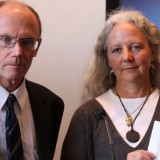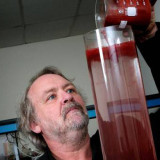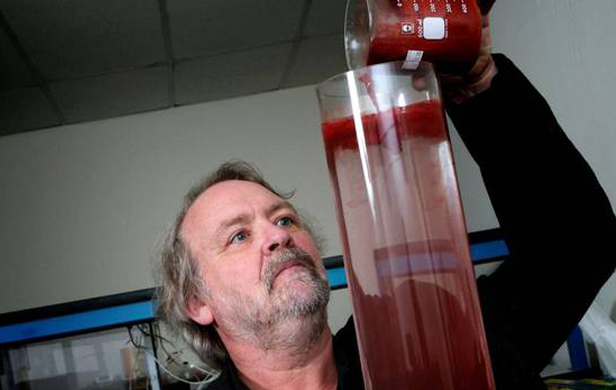It’s been a busy couple of weeks for salmon biologist and anti-fish farm activist Alexandra Morton. In between receiving two prestigious academic honours on opposite sides of the country, she found the time to drop by a few Sobeys grocery stores in Halifax, discover clumps of sea lice on the farmed salmon they were selling and create a national media story that prompted the retailer to yank all the whole farmed salmon from their maritime stores. All in a week’s work for the indefatigable defender of wild salmon.
In Halifax, Morton was honoured last week with the invitation to deliver the annual Ransom A. Myers Lecture in Science and Society – named for the late DFO scientist who predicted the collapse of the east coast cod and resigned from the department when his bosses attempted to silence him. Each year the university invites one similarly talented and independent minded scientist to speak to their issue of concern. Morton’s presentation on the discovery of several catastrophic viruses in BC’s farmed and wild salmon was delivered to a packed house of 400 academics and produced the only standing ovation in the history of the five year program.
Morton and her small team of research assistants made use of their trip to the east coast to meet with biologists, conservation groups and fishermen to learn about the impacts of the open net pen salmon farming industry on their marine environment. She spoke with a number of lobster fishermen, for instance, who have had to abandon their livelihoods due to the crash in their fishery which they connect to the arrival of salmon aquaculture operations. Chemicals used to treat sea lice on the farmed fish are also lethal to shellfish, while fish farm waste covers up the lobsters’ vital seafloor habitat.
Morton also popped into a few Sobeys grocery stores and purchased a couple dozen fish to inspect for microscopic diseases. But it was the larger sea lice that immediately caught her attention – several fish were covered with the parasite. Soon after a colleague posted a picture of the lice on facebook, the media caught wind of the story, prompting the grocery chain to pull all whole farmed salmon from its east coast stores. The company said monday that it was in the process of updating its handling procedures for the product to ensure this embarrassing incident doesn’t repeat itself.
Meanwhile, back in Vancouver, Morton and her colleague, SFU professor Rick Routledge, will be receiving the Sterling Prize in Support of Controversy from SFU tonight. The award, as its title implies, was founded in 1993 “to honour and encourage work that provokes and/or contributes to the understanding of controversy.” According to SFU’s website for the honour, “The Sterling Prize is awarded annually to a recipient whose work presents new ways of looking at the world, ways that are daring and creative.”
Morton and Routledge, who together first discovered the lethal ISA virus in wild BC salmon last year, will deliver a joint talk at the award ceremony, titled “Salmon Farms and Disease: The Importance of Both Academic Freedom and Community-Engaged Research.” The event takes place tonight, Wednesday October 24th, at the Morris J Wosk Centre for dialogue, 580 West Hastings Street. Attendance is free but online registration is required in advance.
Morton’s research has been generating controversy for quite some time, but at these honours and others she’s collected in recent years (including an honourary doctorate from SFU) indicate, her work is being taken more and more seriously by established academia – and now even some major farmed salmon retailers to boot.





